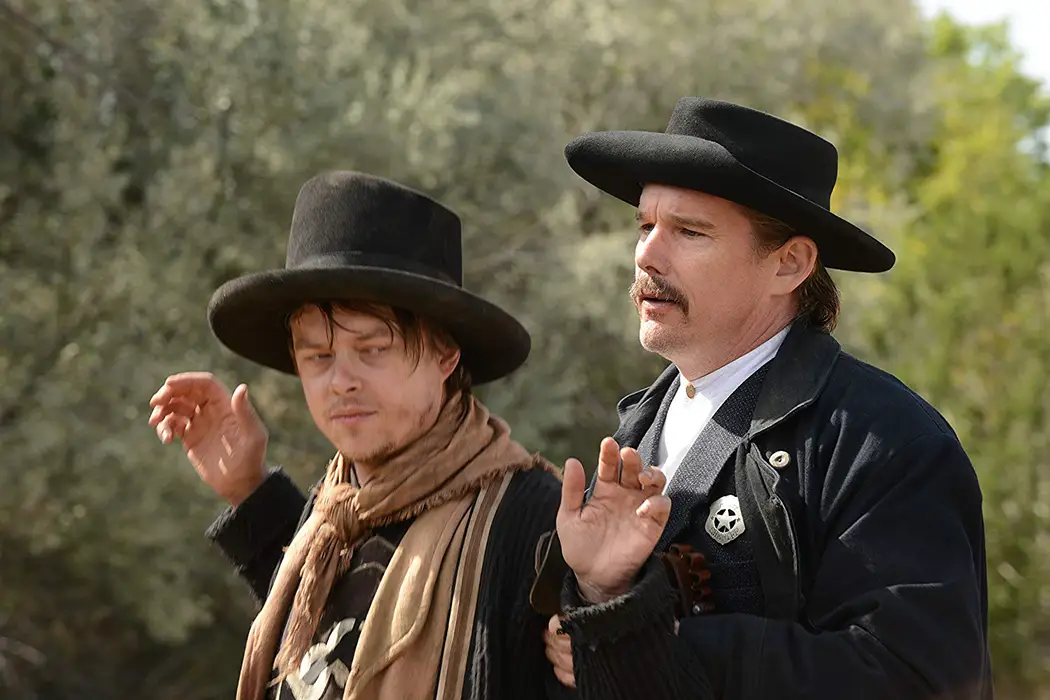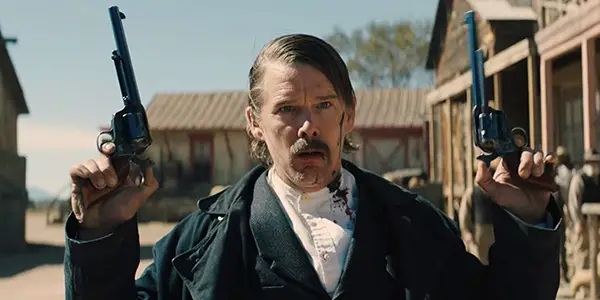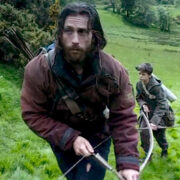THE KID: A Bland, Disjointed Take On A Classic Story

Christina Tucker is a NY-based production assistant and wannabe screenwriter.
The Kid, directed by Vincent D’Onofrio and written by Andrew Lanham, is a take on the story of Pat Garrett and Billy the Kid that incorporates a new, fictionalized coming-of-age story. Rio (Jake Schur, son of Jordan Schur of Mimran Schur Pictures, which produced this picture) murders his abusive father in defense of his mother, and goes on the run with his sister Sara (Leila George) to escape the punishment of his uncle Grant Cutler (Chris Pratt).
Rio and Sara eventually encounter Billy the Kid (Dane DeHaan) and his longtime pursuer, Sheriff Pat Garrett (Ethan Hawke). Rio must eventually rescue his sister from his uncle, and decide which man, Pat or Billy, he is more eager to emulate as he finds his place in the dangerous world of the American West.
D’Onofrio’s attempt to reinvigorate a classic story is largely a disappointment (and inspires only negative comparisons to the 1973 classic Pat Garrett and Billy the Kid). The Kid is an incohesive, moralistic spin on a story that has potential for more nuanced explorations of morality, crime, and justice. The Kid yearns to create a new vision of Billy and Pat’s story using Rio’s adjacent but poorly incorporated coming-of-age, which ultimately weakens Pat and Billy’s story and distracts from strong performances from DeHaan and Hawke.
“By the end, everybody was wrong.”
Ethan Hawke is a fantastic Pat Garrett; he has a remarkable intensity and emotional sensitivity, giving a stronger and more empathetic performance than the film deserves. Garrett struggles to reconcile his personal values with the requirements of his profession; his sympathy for Billy and his desire to see justice done, and Hawke portrays these complicated feelings of frustration throughout. Dane DeHaan also provides a strong performance as Billy the Kid. He is difficult to read, capable, tragic, but playful, plays into his reputation and others’ expectations. DeHaan captures the various shades of the young man admirably, and makes the character surprisingly likable.

Hawke and DeHaan and their relationship and interactions are some of the most entertaining in the film. Every time the film returns to them, either together or apart, after wandering through Rio’s aimless story, it is a breath of fresh air. Their performances are especially impressive considering they don’t have much to work with; most of the dialogue throughout the film is repetitive and trite.
Schur is forgettable as Rio, a baffling character from beginning to end whose basic characteristics as a person are largely unremarked upon; who he was before he committed murder, why he feels attachment to either Billy or Pat, his relationship to his father before his murder, all of these questions were seemingly deemed largely unimportant. Rio exists mostly as a framing device, a lens by which we are meant to more personally connect to Pat and Billy’s story, but without much development in terms of personality, desires, or agency, he is a distraction from the more interesting story going on around him.
“You think your brother ain’t like me?”
Many of the decisions made to accommodate Rio’s story feel contrived; The Kid is forced to incorporate a coming-of-age story that fundamentally does not mesh well with the story of Pat and Billy. Chris Pratt’s Grant Cutler is the villain of Rio’s story, suitably menacing due to costuming and styling that makes Pratt almost unrecognizable, but blandly acted and cartoonishly written, with barely enough screen time to make an impact. He is simply an unhinged criminal who is not only too broadly drawn to offer any emotional impact but also undermines the film’s attempted exploration of grey morality and the thin line between victim of circumstance and perpetrator of violence.

The final climactic confrontation between Rio, Cutler, and Garrett, in which Rio and Garrett attempt to rescue Sara, falls flat because of a lack of adequate setup and over-reliance on Rio’s character arc to provide a satisfying ending to The Kid. These characters’ interpersonal relationships are so underdeveloped throughout the film that the climactic scene feels meaningless; Garrett himself says that he has no qualms about killing Cutler, a man he has never met and knows only as an irredeemable rapist, and there’s no reason for the audience to feel any complex emotions either. Rio’s story is based around a character too passive and unexplored to tie the film together.
“If you kill a man, nothing else matters.”
The abuse of women is repeatedly used throughout The Kid in a way that feels lazy and exploitative, a placeholder for effective storytelling or character building. From Rio’s mother, beaten to death, to Rio’s sister Sara, a victim of sexual violence by Cutler and his associates, women, who are given little development or point of view within the narrative, are abused in lazily written scenes that feel like exploitative caricatures meant to elicit an emotional response.

Rio’s sister Sara begins the film as Rio’s stalwart guardian, a convincing liar and cynical realist, and ends the film a speechless nearly catatonic victim of sexual assault, downgraded from a woman with narrative potential (as someone for Rio to emulate, for example!) to simply a reason Rio and Pat have to work together, a way to paint Cutler as a villain.
Sara, as well as Billy’s girlfriend Paulita (Samantha Zajarias) could have been part of a meaningful and novel angle for the story to explore – the violence and trauma that crime causes for the family and friends of those who commit crimes. Instead, women’s trauma and assault is used to paint villains as irredeemable or provide lackluster explanations for Rio’s actions, when far subtler writing choices could have both felt less exploitative and served as more effective characterization.
The Kid: Conclusion
The Kid feels alternatively rushed and too slow – short on characterization and motivation but dense with meaningless, trite conversations that try and fail to say something interesting about trauma. Aesthetic choices made throughout are strong – the soundtrack is atmospheric and haunting, the film is well-shot and takes advantage of picturesque locations, but there is not nearly enough visual splendor to make up for the film’s faults.
Perhaps the film’s saving grace is the performances of Hawke and DeHaan, but otherwise there is very little to make The Kid memorable. The Kid offers no refreshing take on morality, revenge, or trauma, only the overwhelming feeling of contrivance.
It is the responsibility of films tackling classic characters or well-trod historical moments to bring something new to the source material to justify their existence, or is it merely enough to be an adequate film in its own right, ignoring the precedent of other films?
Does content like this matter to you?
Become a Member and support film journalism. Unlock access to all of Film Inquiry`s great articles. Join a community of like-minded readers who are passionate about cinema - get access to our private members Network, give back to independent filmmakers, and more.












